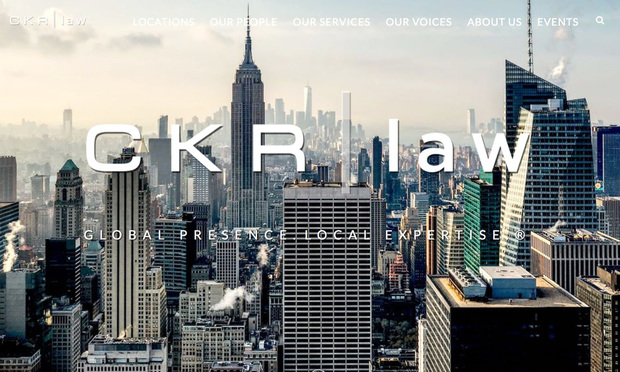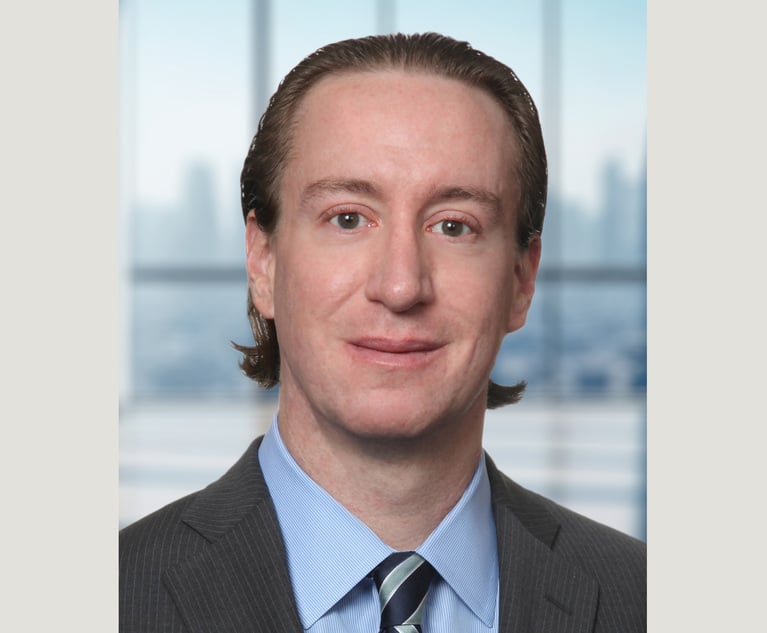Still Shrinking, CKR Announces Deal With an Unexpected Chinese Firm
The New York-based law firm, which continues to see partner exits, has announced a new affiliation with a Chinese firm—on the same day of announcing that talks had ended with another firm in China.
September 23, 2019 at 02:54 PM
6 minute read
 Screenshot of CKR Law website
Screenshot of CKR Law website
CKR Law's managing partner Jeff Rinde announced last week that his firm had struck a "strategic alliance agreement" with a Chinese law firm.
The twist? It wasn't the same Chinese law firm that New York-based CKR said it had been in negotiations with.
About a month ago, CKR said it was in talks to form a new firm entity with Yingke Law Firm, a huge but relatively loosely structured firm of Chinese lawyers. But on Tuesday, the firm announced that it had teamed up with Jingsh, a similarly large firm in China that has undergone rapid growth in recent years. Only later on Tuesday did CKR say that the talks with Yingke had ended.
What's left unsaid in all of CKR's latest announcements is that the New York firm continues to experience partner departures. The firm's website once boasted that it had more than 200 lawyers across 50 locations. But ALM is unable to determine CKR's current head count, and the firm did not respond to a request for comment on its headcount and questions about its operations and affiliations with Chinese firms.
CKR's announcement about the fizzled deal with Yingke said "uncertainties in the current political and economic environment and the anticipated costs of creating and building a new law firm" were behind their decision not to create the new firm. It's not clear what factors changed in the month-long exploratory period.
On the same day, CKR said it had signed a long-term strategic alliance with Jingsh, calling it Beijing's largest legal practice and one of China's largest law firms.
CKR said it will cooperate with Jingsh in marketing, client service and client referrals, and "this will include each firm employing certain of the other firm's lawyers as foreign legal consultants, bilateral lawyer exchanges," and joint efforts in seminars and training presentations for their attorneys, staff and clients.
CKR said the parties intend to "jointly pursue U.S., China and other global opportunities through the sharing of information, financial resources, offices, alliances, affiliations and clients."
Jingsh is in expansion mode. The CKR announcement came just days after Jingsh announced that it would open an office in Dusseldorf, Germany, next month and touted the opening of its North American Business Consulting Center in Toronto. Jingsh described the center as a "one-stop" source for "professional legal business services" and a pillar of support for China's Belt and Road Initiative, a massive push to increase international investment.
Yang Jianhua, the managing partner and CEO of Jingsh (who formerly led Yingke's Beijing office), told ALM his firm had more than 3,500 lawyers in China, including more than 1,000 in Beijing. He said the firm was in the process of setting up a New York office and said CKR would act as a "consultant" in that process. He added that the firms had not agreed to merge.
For its part, Yingke has said it isn't slowing down. Mei Xiangrong, Yingke's global chairman, told ALM that the decision to call off the new firm was made after due diligence. Yingke will pursue its own U.S. office independently, he said. Li Yongyuan, who also goes by Henry Li and is a partner and head of the firm's China-U.S. cross-border practice team, said in an interview that the firm is looking to create its own offices in the U.S. by late October or early November with five or 10 laterals.
"The [CKR] deal was not approved by the executive committee," he said. "It was a friendly termination. We are still friends with Jeff Rinde and other partners at CKR."
The 'Root' of Problems?
CKR's announcements about two Chinese firms follow several lateral exits. The co-chairs of CKR's corporate practice were among three attorneys who left to join Sichenzia Ross Ference earlier this month. Meanwhile. a group of ex-CKR lawyers are now listed on the website of Intelink Law Group, and Michelman & Robinson and Robinson Brog Leinwand Greene Genovese & Gluck have each added two former CKR partners. At least two of its lawyers are now at Taylor English Duma, and others have gone back to running their own firms.
ALM first reported in May that CKR hadn't paid partner draws in months. Rinde and Michael Maloney, another top lawyer at the firm, assured partners that the money was merely hung up because of problems with banks. Later, however, they blamed partners for not bringing over the volume of business they claimed to have or said billings came in below targets.
Several people familiar with the firm have told ALM that some departed partners are owed five or six figures, and some former CKR lawyers are mediating with the firm. Other partners are owed significantly less or have reached settlements that typically saw them walk away with their receivables or unbilled work-in-progress, sources said. Rinde, CKR's managing partner, has previously said the firm "intends to honor its commitments" to "performing partners."
One former senior partner at the firm said the cash crunch stemmed, in part, from Rinde offering overly generous terms to many early partners. "Even if they didn't bring the books of business that they promised, he signed contracts that no businessman should have signed," the former senior partner said. "You don't bring a partner over and promise to pay them X dollars without any reciprocal promise from that partner."
Still, this former partner said, many lawyers had books of business in the hundreds of thousands or low millions. The former partner said the "root" of the problem was not a lack of business, but bad business decisions, citing as an example the firm's dealings with Hammond Law Group, an Ohio-based immigration law firm with four offices.
CKR announced in June that it had finalized a "strategic relationship" with Hammond Law Group that entailed referrals and close cooperation. Three people told ALM that the firms had been closely integrated, however, with CKR issuing paychecks to some Hammond lawyers and staff and paying some of its lease expenses. But the new expenses weren't offset with rising revenues from the deal, the former partner said.
Michael Hammond, the firm's founder, said CKR didn't go so far as assuming the leases, nor were all Hammond Law Group lawyers on CKR's payroll, but he confirmed that CKR paid for some of the firm's leases and was paying some of its employees. That is no longer the case, he said.
Rinde declined to be interviewed and did not respond to written questions about the Jingsh and Yingke arrangements. He also did not respond to a request for comment about the former partner's comments.
Anna Zhang contributed to this report.
This content has been archived. It is available through our partners, LexisNexis® and Bloomberg Law.
To view this content, please continue to their sites.
Not a Lexis Subscriber?
Subscribe Now
Not a Bloomberg Law Subscriber?
Subscribe Now
NOT FOR REPRINT
© 2025 ALM Global, LLC, All Rights Reserved. Request academic re-use from www.copyright.com. All other uses, submit a request to [email protected]. For more information visit Asset & Logo Licensing.
You Might Like
View All
Saul Ewing Loses Two Partners to Fox Rothschild, Marking Four Fla. Partner Exits in Last 13 Months
3 minute read
Dentons Taps D.C. Capital Markets Attorney for New US Managing Partner

Exceptional Growth Becoming the Rule? Demand Drove Strong Year for Big Law

Eagles or Chiefs? At These Law Firms, Super Bowl Sunday Gets Complicated
3 minute readTrending Stories
- 1Ex-Starbucks GC Exiting Latest Role, Will Get Severance
- 2Family Law Special Section 2025
- 3We Must Uphold the Rights of Immigrant Students
- 4Orrick Picks Up 13-Lawyer Tech, VC Group From Gunderson Dettmer
- 5How Alzheimer’s and Other Cognitive Diseases Affect Guardianship, POAs and Estate Planning
Who Got The Work
J. Brugh Lower of Gibbons has entered an appearance for industrial equipment supplier Devco Corporation in a pending trademark infringement lawsuit. The suit, accusing the defendant of selling knock-off Graco products, was filed Dec. 18 in New Jersey District Court by Rivkin Radler on behalf of Graco Inc. and Graco Minnesota. The case, assigned to U.S. District Judge Zahid N. Quraishi, is 3:24-cv-11294, Graco Inc. et al v. Devco Corporation.
Who Got The Work
Rebecca Maller-Stein and Kent A. Yalowitz of Arnold & Porter Kaye Scholer have entered their appearances for Hanaco Venture Capital and its executives, Lior Prosor and David Frankel, in a pending securities lawsuit. The action, filed on Dec. 24 in New York Southern District Court by Zell, Aron & Co. on behalf of Goldeneye Advisors, accuses the defendants of negligently and fraudulently managing the plaintiff's $1 million investment. The case, assigned to U.S. District Judge Vernon S. Broderick, is 1:24-cv-09918, Goldeneye Advisors, LLC v. Hanaco Venture Capital, Ltd. et al.
Who Got The Work
Attorneys from A&O Shearman has stepped in as defense counsel for Toronto-Dominion Bank and other defendants in a pending securities class action. The suit, filed Dec. 11 in New York Southern District Court by Bleichmar Fonti & Auld, accuses the defendants of concealing the bank's 'pervasive' deficiencies in regards to its compliance with the Bank Secrecy Act and the quality of its anti-money laundering controls. The case, assigned to U.S. District Judge Arun Subramanian, is 1:24-cv-09445, Gonzalez v. The Toronto-Dominion Bank et al.
Who Got The Work
Crown Castle International, a Pennsylvania company providing shared communications infrastructure, has turned to Luke D. Wolf of Gordon Rees Scully Mansukhani to fend off a pending breach-of-contract lawsuit. The court action, filed Nov. 25 in Michigan Eastern District Court by Hooper Hathaway PC on behalf of The Town Residences LLC, accuses Crown Castle of failing to transfer approximately $30,000 in utility payments from T-Mobile in breach of a roof-top lease and assignment agreement. The case, assigned to U.S. District Judge Susan K. Declercq, is 2:24-cv-13131, The Town Residences LLC v. T-Mobile US, Inc. et al.
Who Got The Work
Wilfred P. Coronato and Daniel M. Schwartz of McCarter & English have stepped in as defense counsel to Electrolux Home Products Inc. in a pending product liability lawsuit. The court action, filed Nov. 26 in New York Eastern District Court by Poulos Lopiccolo PC and Nagel Rice LLP on behalf of David Stern, alleges that the defendant's refrigerators’ drawers and shelving repeatedly break and fall apart within months after purchase. The case, assigned to U.S. District Judge Joan M. Azrack, is 2:24-cv-08204, Stern v. Electrolux Home Products, Inc.
Featured Firms
Law Offices of Gary Martin Hays & Associates, P.C.
(470) 294-1674
Law Offices of Mark E. Salomone
(857) 444-6468
Smith & Hassler
(713) 739-1250










